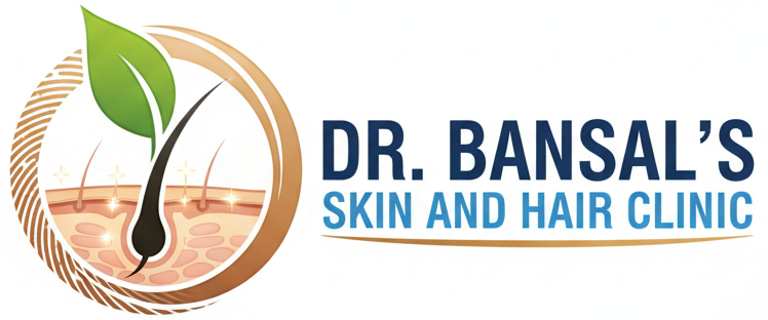Dry Dandruff Treatment in Indore
Dr. Bansal's Hair Clinic, Indore
On Dry Dandruff
Dry dandruff, also known as scalp dandruff, is a condition whereby white, small, powdery flakes appear on your scalp, often accompanied by itchiness, dryness, and irritation.
It differs from oily dandruff-seborrheic dermatitis is associated with yellow, greasy flakes and redness.
Dry dandruff is when the scalp loses moisture and the skin becomes flaky, with flakes building up.
Dry Dandruff - Main Causes
❄️ Dry scalp: from cold weather, hot showers, or low humidity.
Harsh shampoos or chemicals strip away natural scalp oils.
???? Lack of hydration and nutrition – not enough water or essential fatty acids.
???? Mild fungal overgrowth of Malassezia thus irritates and dries the scalp.
???? Stress affects sebum balance and skin health.
???? Skin conditions – eczema, psoriasis, or contact dermatitis.
What to Do (Treatment & Prevention)
1. Gentle Hair Care Routine
Wash hair 2–3 times a week, not daily, using a mild, moisturizing anti-dandruff shampoo.
Wash your hair using lukewarm, not hot, water.
Gently massage your scalp when you shampoo to remove flakes.
Always condition after shampooing to restore moisture.
2. Use the Right Shampoos
Look for these active ingredients:
Zinc pyrithione - dandruff-fighting fungus.
Ketoconazole - an antifungal for resistant dandruff.
Salicylic acid – exfoliates flakes gently.
Coal tar – reduces scaling and itchiness (for psoriasis-type dandruff).
Tea tree oil is naturally antifungal, soothing.
Balance: Unless otherwise indicated, alternate a medicated shampoo with a moisturizing shampoo.
3. Oil and Hydrate the Scalp
Apply warm coconut oil, olive oil, or almond oil 1–2 times a week before washing.
Leave for 30–60 minutes, then rinse with mild shampoo.
Hydrate — drink plenty of water every day.
Use a humidifier in dry weather to maintain moisture in the air.
4. Healthy Diet
Eat foods rich in:
Omega-3 fatty acids: fish, walnuts, flaxseeds.
Zinc & Vitamin B-complex: eggs, whole grains, nuts.
Vitamin E: avocados, seeds, olive oil.
Probiotics: yogurt, kefir, or fermented foods for scalp health.
5. Lifestyle & Stress Management
Get 7–8 hours of sleep daily.
Manage stress through meditation, exercise, or yoga.
Avoid smoking and alcohol — they dry out the skin.
What Not to Do
❌ Don’t use very hot water — it strips scalp oils.
❌ Avoid using harsh shampoos, alcohol-based gels, or sprays.
❌ Don't scratch or pick flakes, because it irritates the scalp. ❌ Avoid overwashing because it exacerbates dryness. ❌ Stop ignoring persistent itching or redness that may be a sign of an infection or disease.
Care
Dr. Shreyas Bansal has over 46 years of experience in promoting hair health and wellness. At Dr. Bansal’s Homeopathy Clinic, located at 2 Manish Bagh, Sapna Sangeeta Road, Indore, we provide personalised care to strengthen your hair, improve scalp health, and restore confidence naturally.
Health Hairs AT
Beauty
+91 9926120111
© 2025. All rights reserved.
